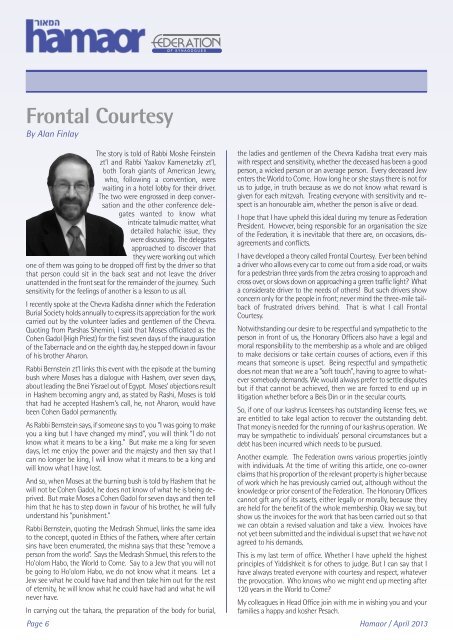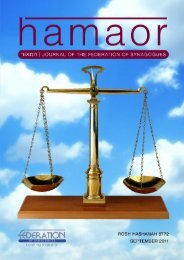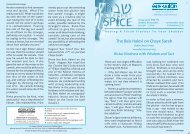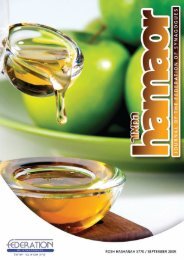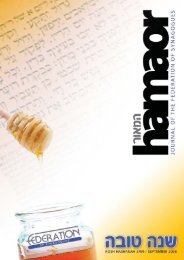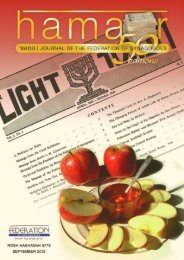Pesach 5773 - 18/03/2013 - Federation Of Synagogues
Pesach 5773 - 18/03/2013 - Federation Of Synagogues
Pesach 5773 - 18/03/2013 - Federation Of Synagogues
You also want an ePaper? Increase the reach of your titles
YUMPU automatically turns print PDFs into web optimized ePapers that Google loves.
Frontal Courtesy<br />
By Alan Finlay<br />
The story is told of Rabbi Moshe Feinstein<br />
zt’l and Rabbi Yaakov Kamenetzky zt’l,<br />
both Torah giants of American Jewry,<br />
who, following a convention, were<br />
waiting in a hotel lobby for their driver.<br />
The two were engrossed in deep conversation<br />
and the other conference delegates<br />
wanted to know what<br />
intricate talmudic matter, what<br />
detailed halachic issue, they<br />
were discussing. The delegates<br />
approached to discover that<br />
they were working out which<br />
one of them was going to be dropped off first by the driver so that<br />
that person could sit in the back seat and not leave the driver<br />
unattended in the front seat for the remainder of the journey. Such<br />
sensitivity for the feelings of another is a lesson to us all.<br />
I recently spoke at the Chevra Kadisha dinner which the <strong>Federation</strong><br />
Burial Society holds annually to express its appreciation for the work<br />
carried out by the volunteer ladies and gentlemen of the Chevra.<br />
Quoting from Parshas Shemini, I said that Moses officiated as the<br />
Cohen Gadol (High Priest) for the first seven days of the inauguration<br />
of the Tabernacle and on the eighth day, he stepped down in favour<br />
of his brother Aharon.<br />
Rabbi Bernstein zt’l links this event with the episode at the burning<br />
bush where Moses has a dialogue with Hashem, over seven days,<br />
about leading the Bnei Yisrael out of Egypt. Moses’ objections result<br />
in Hashem becoming angry and, as stated by Rashi, Moses is told<br />
that had he accepted Hashem’s call, he, not Aharon, would have<br />
been Cohen Gadol permanently.<br />
As Rabbi Bernstein says, if someone says to you “I was going to make<br />
you a king but I have changed my mind”, you will think “I do not<br />
know what it means to be a king.” But make me a king for seven<br />
days, let me enjoy the power and the majesty and then say that I<br />
can no longer be king, I will know what it means to be a king and<br />
will know what I have lost.<br />
And so, when Moses at the burning bush is told by Hashem that he<br />
will not be Cohen Gadol, he does not know of what he is being deprived.<br />
But make Moses a Cohen Gadol for seven days and then tell<br />
him that he has to step down in favour of his brother, he will fully<br />
understand his “punishment.”<br />
Rabbi Bernstein, quoting the Medrash Shmuel, links the same idea<br />
to the concept, quoted in Ethics of the Fathers, where after certain<br />
sins have been enumerated, the mishna says that these “remove a<br />
person from the world”. Says the Medrash Shmuel, this refers to the<br />
Ho’olom Habo, the World to Come. Say to a Jew that you will not<br />
be going to Ho’olom Habo, we do not know what it means. Let a<br />
Jew see what he could have had and then take him out for the rest<br />
of eternity, he will know what he could have had and what he will<br />
never have.<br />
In carrying out the tahara, the preparation of the body for burial,<br />
the ladies and gentlemen of the Chevra Kadisha treat every mais<br />
with respect and sensitivity, whether the deceased has been a good<br />
person, a wicked person or an average person. Every deceased Jew<br />
enters the World to Come. How long he or she stays there is not for<br />
us to judge, in truth because as we do not know what reward is<br />
given for each mitzvah. Treating everyone with sensitivity and respect<br />
is an honourable aim, whether the person is alive or dead.<br />
I hope that I have upheld this ideal during my tenure as <strong>Federation</strong><br />
President. However, being responsible for an organisation the size<br />
of the <strong>Federation</strong>, it is inevitable that there are, on occasions, disagreements<br />
and conflicts.<br />
I have developed a theory called Frontal Courtesy. Ever been behind<br />
a driver who allows every car to come out from a side road, or waits<br />
for a pedestrian three yards from the zebra crossing to approach and<br />
cross over, or slows down on approaching a green traffic light? What<br />
a considerate driver to the needs of others! But such drivers show<br />
concern only for the people in front; never mind the three-mile tailback<br />
of frustrated drivers behind. That is what I call Frontal<br />
Courtesy.<br />
Notwithstanding our desire to be respectful and sympathetic to the<br />
person in front of us, the Honorary <strong>Of</strong>ficers also have a legal and<br />
moral responsibility to the membership as a whole and are obliged<br />
to make decisions or take certain courses of actions, even if this<br />
means that someone is upset. Being respectful and sympathetic<br />
does not mean that we are a “soft touch”, having to agree to whatever<br />
somebody demands. We would always prefer to settle disputes<br />
but if that cannot be achieved, then we are forced to end up in<br />
litigation whether before a Beis Din or in the secular courts.<br />
So, if one of our kashrus licensees has outstanding license fees, we<br />
are entitled to take legal action to recover the outstanding debt.<br />
That money is needed for the running of our kashrus operation. We<br />
may be sympathetic to individuals’ personal circumstances but a<br />
debt has been incurred which needs to be pursued.<br />
Another example. The <strong>Federation</strong> owns various properties jointly<br />
with individuals. At the time of writing this article, one co-owner<br />
claims that his proportion of the relevant property is higher because<br />
of work which he has previously carried out, although without the<br />
knowledge or prior consent of the <strong>Federation</strong>. The Honorary <strong>Of</strong>ficers<br />
cannot gift any of its assets, either legally or morally, because they<br />
are held for the benefit of the whole membership. Okay we say, but<br />
show us the invoices for the work that has been carried out so that<br />
we can obtain a revised valuation and take a view. Invoices have<br />
not yet been submitted and the individual is upset that we have not<br />
agreed to his demands.<br />
This is my last term of office. Whether I have upheld the highest<br />
principles of Yiddishkeit is for others to judge. But I can say that I<br />
have always treated everyone with courtesy and respect, whatever<br />
the provocation. Who knows who we might end up meeting after<br />
120 years in the World to Come?<br />
My colleagues in Head <strong>Of</strong>fice join with me in wishing you and your<br />
families a happy and kosher <strong>Pesach</strong>.<br />
Page 6 Hamaor / April <strong>2013</strong>


